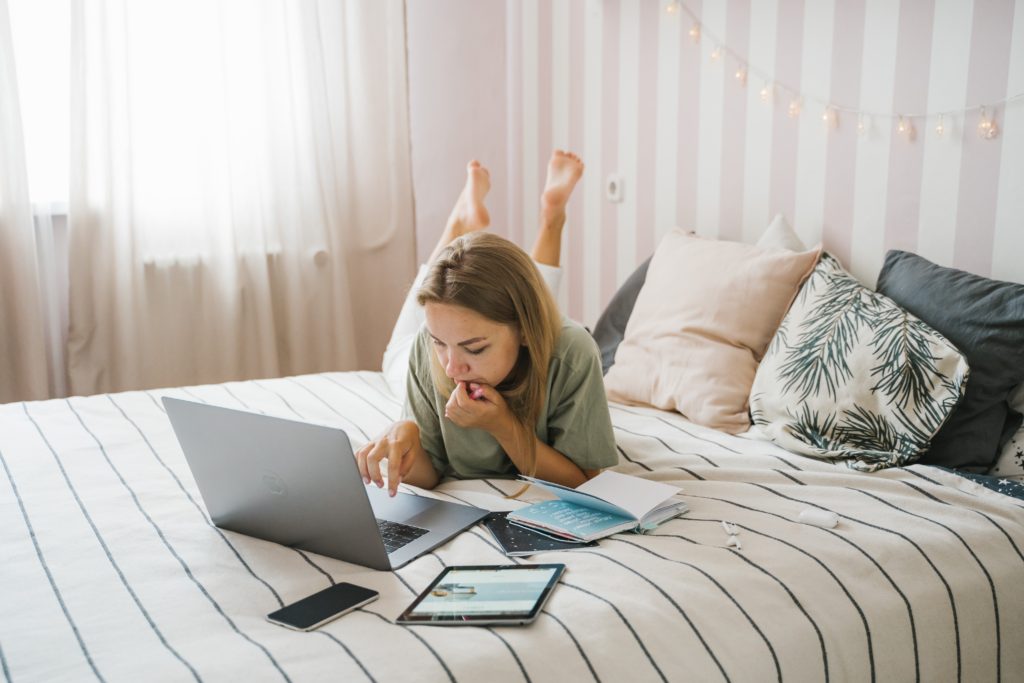Working from home has been a staple in the last 2 years or so and ever so recently just been introduced by the PM, Boris Johnson, as he advises in the Christmas period to work from home if you can do so.
Throughout the pandemic, the mental health and wellbeing of employees and the general population has been significantly affected.
Working from home for extended periods can be extremely difficult to adjust to – especially if the rules are changing. For many of us, it means learning how to manage our different areas of work under new circumstances.
In this Wellspace blog, we are going to give you some tips to improve wellbeing when working from home and how to tackle the pitfalls that come with it.
The Pitfalls Of Working From Home
Before we explore the solutions and tips to improve wellbeing when working from home, let’s dive into the issues that are causing your problems.
If you’re already working from home, you’ll understand the battle with maintaining a healthy work-life balance. If your home is your office, you may often feel the urge to check your work email even after your shift has ended.
Or Alternatively, because you’re in your own comforts that you’re used to not working in, you may get distracted far more than usual. Whenever you get interrupted, could be your phone or a family member, your productivity drops, and on average, it takes 25 minutes to return to the original task.
Finally, you may struggle to stay motivated when working from home. The informal setting of the home is our place to relax, and this can be hard to get over. Without the environmental cues of traditional office space, finding inspiration to stay on top of tasks can be a big challenge.
5 Tips To Look After Your Wellbeing When Working From Home
 Maintain A Regular Routine
Maintain A Regular Routine
We are creatures of habit, so a regular schedule is important. Set a routine and stick to it. If you’re new to working from home, try to adhere to your normal office hours and routine as much as possible.
Get up, get dressed and have some breakfast. Arrive at your desk 5-10 minutes before the start to check any emails and set your tasks for the day. If you feel overwhelmed by your tasks divide your day up, for example before and after your lunch break.
When the working day is done, log off and focus on personal activities and priorities to avoid burnout and maintain a healthy work-life balance.
Prioritise Your Lunch Break
It is important to look after your wellbeing by prioritising your lunch break. Make yourself a nice lunch the night before as if you were going to the office. Having something nice to look forward to motivates you and acknowledges that you are important.
Stepping away from your workspace allows you to recharge for the afternoon. It can be difficult to do this but the more you practice it, the more chance you have of it becoming a habit.
Create Your Own Workspace
Although it’s tempting to head to your sofa or just stay in bed all day with your laptop, you may find setting up a work area helps you stay focused. If you can, try to set aside a specific area or space where you can work. If you don’t have a desk, your dining table or a worktop.
Besides making you feel like you’re at an “office,” this helps you maintain good posture, avoid distractions, and mentally leave your work behind at the end of the day. Our advice is that you should adjust your chair so you can use the keyboard with your wrists and forearms straight and level with the floor.
Adopt A Growth Mindset
A growth mindset can help you embrace challenges, change your perception of your results and increase your desire to improve and learn.
When you shift focus from your abilities to the sincere effort of doing a task, motivation naturally follows. Embracing a growth mindset helps you persevere even amid challenging obstacles.
If you choose to follow this tip, we’d recommend creating a diary of your achievements. If you’re a manager of a team then provide them with praise and gratitude for their continued efforts in these unprecedented times.
Ask For Help
If you feel overwhelmed or lonely working from home, don’t be afraid to ask for help. Dips in our wellbeing and emotions are normal. Be aware of them and express them to your manager or senior leader.
Your organisation’s Wellbeing program, if it has one, is also available for support. If not, could you reach out to a trusted mentor, friend, or colleague?
Wellspace: Wellbeing Reimagined
Help your staff become the best version of themselves with Wellspace employee health and wellbeing training. We hope we’ve give you some useful tips to improve wellbeing when working from home. Our health and wellness experts have been making a difference in a wide variety of sectors for several years, and your business could be the next one.
We are the leading application and training services for health and wellbeing in the workplace. If you’d like to get in touch and bring your best team to work, or home then please don’t hesitate to contact our friendly team.










